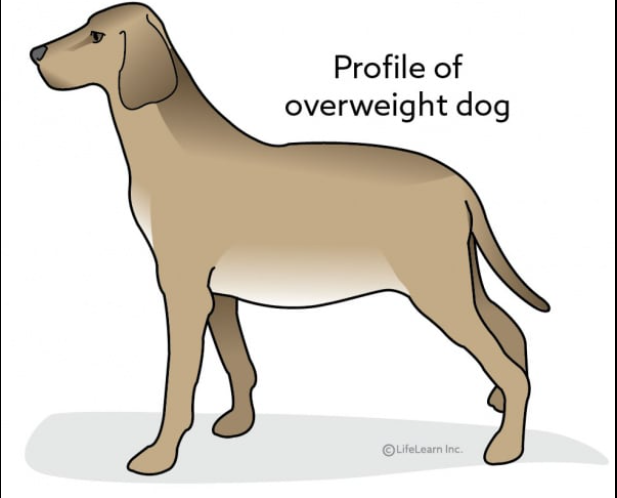If your dog appears to be overweight, a recent study suggests that probiotics may help( Probiotics for Dogs).
Two probiotic strains were shown by researchers to be effective in helping obese dogs lose weight. Principal researcher Younghoon Kim, an agricultural biotechnology professor at Seoul National University in Korea, stated, “The strains we carefully selected demonstrated remarkable success in reducing the body fat percentage in dogs.” The researchers examined the variations in the gut microbiomes of young and old dogs because, despite the fact that around half of all dogs are obese, the condition is more common in older dogs.
Researchers discovered that the populations of two lactic acid bacteria species, Enterococcus and Bifidobacterium, drop in elderly dogs. Researchers gave two particular strains of bacteria—Enterococcus faecium IDCC 2102 and Bifidobacterium lactis IDCC 4301—to a group of beagles in order to investigate whether these germs are linked to canine obesity. After giving the beagles probiotics, the researchers fed them a high-fat meal to determine if they would still gain weight. The beagles lost weight and reduced body fat in spite of their diet, and their energy metabolism increased as well. The results were released in the journal Microbiology Spectrum on January 25.
Also read-Blindness Deafness 5e [DM Tips, Rules, And 9 Ways To Use The DnD Spell]

Probiotics For Dogs
The results “confirmed a shift in the body’s metabolic orientation towards fat consumption rather than fat accumulation,” Kim added. The loss of body fat also provided other health benefits for the beagles, including lower inflammation levels and enhanced insulin production.

Probiotics For Dogs
Further, the increase in beneficial bacteria boosted the dogs’ immune system, acting in defense against harmful bacteria. What’s particularly encouraging is that these changes aren’t fleeting, Kim said. The gut bacteria persist in the dogs’ bodies, ensuring that their benefits will be sustained over time. Kim called for more research on tailored probiotics for family pets. “While types of probiotics suitable for human consumption or commercial livestock have been identified and established, the absence of standardized guidelines for companion animals is a glaring gap,” Kim said.

Probiotics For Dogs
Introduction to probiotics for dogs
Probiotics, once solely associated with human health, are now gaining popularity as a beneficial supplement for dogs. Just like in humans, probiotics for dogs aim to support a healthy balance of gut bacteria, which plays a crucial role in their overall well-being. In this article, we’ll explore the benefits, potential risks, and best practices of using probiotics for dogs.

Probiotics For Dogs
Understanding Probiotics for Dogs
Probiotics are live microorganisms that, when administered in adequate amounts, confer health benefits to the host. In dogs, these microorganisms primarily include various strains of bacteria and yeast, such as Lactobacillus and Bifidobacterium species. These probiotics can be naturally found in some foods or administered as supplements.

Benefits of Probiotics for Dogs
Improved Digestive Health: Probiotics help maintain a healthy balance of gut bacteria, which is essential for proper digestion and nutrient absorption in dogs.
- Immune System Support: A significant portion of a dog’s immune system resides in the gut. By promoting a healthy gut microbiota, probiotics can indirectly support the immune system.
- Management of Digestive Disorders: Probiotics have been studied for their potential to alleviate symptoms of digestive disorders in dogs, such as diarrhea and irritable bowel syndrome (IBS).
- Reduced Risk of Infections: Certain probiotic strains have antimicrobial properties that may help prevent or reduce the severity of gastrointestinal infections in dogs.

Potential Risks and Considerations
While probiotics are generally considered safe for dogs, there are some potential risks and considerations to keep in mind:
Quality and Source: Not all probiotic supplements for dogs are created equal. It’s essential to choose high-quality products from reputable manufacturers to ensure efficacy and safety.
Dosage and Administration: The appropriate dosage of probiotics for dogs may vary based on factors such as the dog’s size, age, and health condition. Always follow the recommended dosage instructions provided by the manufacturer or your veterinarian.
Underlying Health Conditions: Dogs with certain underlying health conditions or compromised immune systems may not be suitable candidates for probiotic supplementation. Consult with your veterinarian before starting any new supplements.
Potential Side Effects: While rare, some dogs may experience mild gastrointestinal upset when starting probiotics. Monitor your dog closely for any signs of adverse reactions and discontinue use if necessary.

Best Practices for Using Probiotics in Dogs
Consult with Your Veterinarian: Before starting your dog on probiotic supplements, consult with your veterinarian to determine if it’s appropriate for their specific needs.
Choose the right product. Select a probiotic supplement formulated specifically for dogs, preferably one that contains a variety of bacterial strains and has undergone quality testing.
Gradually Introduce Probiotics: When introducing probiotics to your dog’s diet, start with a lower dosage and gradually increase it over time to allow their digestive system to adjust.
Monitor for Effects: Pay attention to any changes in your dog’s digestive health, stool quality, and overall well-being after starting probiotics. Adjust the dosage or discontinue use if necessary.

Conclusion
Probiotics can be a valuable addition to your dog’s overall wellness regimen when used appropriately. By understanding the benefits, risks, and best practices associated with probiotics for dogs, you can make informed decisions to support your furry friend’s digestive health and well-being. As always, consult with your veterinarian for personalized recommendations based on your dog’s individual needs.

images source: Google
Disclaimer: The opinions and suggestions expressed in this article are solely those of the individual analysts. These are not the opinions of HNN. For more, please consult with your doctor




































